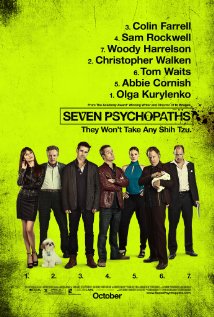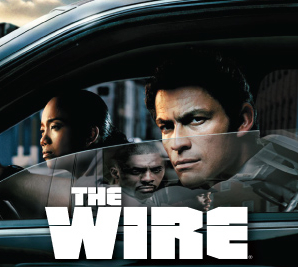Before I begin, I want to be clear that I don’t actually feel judged by anyone on the following matter. I’m writing this because of a conversation I had recently with someone I love about what they do and don’t feel comfortable watching, and I’ve just been thinking about whether or not explicit content is essential to some movies and why I allow myself to watch it. This is just my internal monologue ordered on a page, just me playing with words and ideas. I think my favorite thing to come out of this post is the following couplet: “proliferative profanity.”
________________________________________________________________
 I recently saw and reviewed Seven Psychopaths, the latest dark comedy from Martin McDonagh. In Bruges, his first film, is one of my favorites. When I liquidated my dvd collection last spring of all but my most essential movies, In Bruges was one of the 20 or so I kept.
I recently saw and reviewed Seven Psychopaths, the latest dark comedy from Martin McDonagh. In Bruges, his first film, is one of my favorites. When I liquidated my dvd collection last spring of all but my most essential movies, In Bruges was one of the 20 or so I kept.
Both In Bruges and Seven Psychopaths are violent throughout, sexually explicit in moments, and packed with profanity. They are also both stridently anti-violent and condemnatory of the sexual exploitation of women. Language might be the only area where, in the end, one might negatively condemn these films. They are, after all, unapologetic about their proliferative profanity. As a rule though, I consider language’s appropriateness based on the context of the characters. Irish hit men using the “f word” liberally seems appropriate; a Quaker speaking similarly would be out of order. McDonagh’s films display a consistent and logical use of profanity.
All that being said, a lot of my friends and family members would find both these films absolutely reprehensible because of their explicit content. I understand that.
I overstated that. Let me try again.
All that begin said, a lot of my friends and family members wouldn’t be able to personally handle the explicit content in these films. They wouldn’t necessarily think there is anything morally wrong with these films. They just wouldn’t be able to watch and listen to them like I can. (A few would find them morally bankrupt because of their content, but most wouldn’t.)
I’m really not interested in forcing my movie watching ethic on anyone else. I understand that people are at different places concerning what they can and can’t handle in movies. I think we are required to deal gently with one another, and just as I don’t force my ethic on others and tell them what they should watch, I appreciate when they don’t force theirs on me and tell me what I shouldn’t watch.
I adore Seven Psychopaths. I find it to be a profoundly moral film, and it has inspired me to deeply consider and pursue non-violence in every aspect of my life. The story could not have been told less explicitly either. The way it flips its violent images from the beginning of the story to the end is remarkable. In the movie, it’s impossible to emotionally grasp the profundity of a Buddhist monk’s non-violent protest unless you’ve first sat and watched a serial killer be brutally murdered in a similar fashion.
 In another recent film, The Master, two characters shout the “f word” at each other repeatedly until they both shout it in unison once and then continue to shout it at each other in an increasingly broken rhythm, demonstrating better than any other moment in the film, in my opinion, the symbiotic and yet ultimately antagonistic relationship between the two characters. Could they have shouted a different word? I suppose, but anything else would have lacked power, been inconsistent with the anger burning in each man, and failed to hint at their repressed homoerotic attraction to one another. It’s the whole movie in about 15 seconds, and it couldn’t have been done any other way.
In another recent film, The Master, two characters shout the “f word” at each other repeatedly until they both shout it in unison once and then continue to shout it at each other in an increasingly broken rhythm, demonstrating better than any other moment in the film, in my opinion, the symbiotic and yet ultimately antagonistic relationship between the two characters. Could they have shouted a different word? I suppose, but anything else would have lacked power, been inconsistent with the anger burning in each man, and failed to hint at their repressed homoerotic attraction to one another. It’s the whole movie in about 15 seconds, and it couldn’t have been done any other way.
There was a time not long ago when I would have been incapable of appreciating either of these movies. I, like many of my friends and family members, would have been put off by the explicit content. I had a particular aversion to sexually explicit content. I actually participated in most of my film education by only watching edited versions of many films and shading bottom halves of the screen while watching certain scenes in many others. Then, I started reviewing films as part of my responsibilities with Reel Spirituality, and I realized I was going to have to start watching much more than I was accustomed to watching. I prayed and asked God to help me be able to watch things I couldn’t watch before if He was going to have me do this new job.
 The cinematic object that finally dramatically changed my perspective was the HBO series The Wire. The show is as explicit in every way as anything else out there. It’s also the most life affirming thing I’ve ever watched. No television show or movie I’ve ever watched wants the world to be made new as much as The Wire, and the explicit content it contains is in service of that goal. The pursuit of The Wire is truth and loving action based on the truth. Sometimes telling the truth means using profanity, showing brutal violence, and featuring characters who engage in many forms of sexual activity, because life in Baltimore features those things, just like life everywhere features those things.
The cinematic object that finally dramatically changed my perspective was the HBO series The Wire. The show is as explicit in every way as anything else out there. It’s also the most life affirming thing I’ve ever watched. No television show or movie I’ve ever watched wants the world to be made new as much as The Wire, and the explicit content it contains is in service of that goal. The pursuit of The Wire is truth and loving action based on the truth. Sometimes telling the truth means using profanity, showing brutal violence, and featuring characters who engage in many forms of sexual activity, because life in Baltimore features those things, just like life everywhere features those things.
My desire is to see more beauty (wholeness, goodness, completeness) in the world. Sometimes seeing more beauty means looking in places I used to be afraid to look and applauding the beauty shining there. Sometimes seeing more beauty means creating beauty where I don’t see any. I believe the world is moving toward the Beautiful, that Beauty is overtaking everything. It is my humble pleasure to see it and join in.
I guess the question is begged: What’s the use of seeing beauty in these hard to look places? Is this something in which everyone should participate? Does it matter if someone never sees the beauty I see in Seven Psychopaths or The Master if they can’t personally watch something as explicit as those films?
I don’t know. I think what’s important is that we give each other grace, that we learn to value the beauty that each other sees, that if we can’t all look in the same place, we at least listen to each other tell about the beauty we see in the places we can look and together get a better picture of all the good God is doing in the world.

